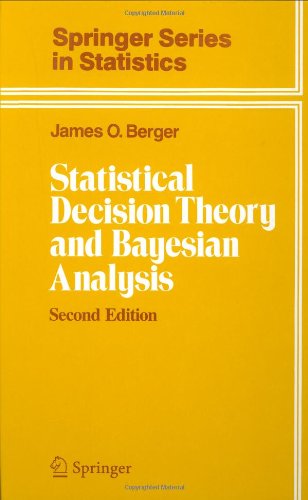Statistical decision theory and bayesian analysis ebook
Par cowell wanda le dimanche, mai 15 2016, 12:26 - Lien permanent
Statistical decision theory and bayesian analysis. James O. Berger

Statistical.decision.theory.and.bayesian.analysis.pdf
ISBN: 0387960988,9780387960982 | 316 pages | 8 Mb

Statistical decision theory and bayesian analysis James O. Berger
Publisher: Springer
Berger, statistical decision theory and bayesian analysis. Mackay, information theory, inference and learning algorithms. This discussion also reminds me of some statistical debates, where many statisticians have argued the need for a decision-theoretic approach to analysis. One of the directions for developing the corresponding methods is the fuzzy classification which applies the main ideas of fuzzy set theory to various classification problems. While reading Chapter 22 of your book, Bayesian Data Analysis (2nd ed.) – I came upon the section on the *Distinction between decision analysis and 'statistical decision theory'* (p. A special very important problem of the statistical machine learning is the classification problem which can be regarded as a task of classifying some objects into classes in accordance with their properties or features. And use of hierarchical linear models (HLM), the book has been. Springer 1985 (£52.99 hardback). The value of the loss function itself is a random quantity because it depends on the outcome of a random variable X. Statistical Decision Theory and Bayesian Analysis | SPSSGuide.com . Berger Statistical Decision Theory and Bayesian Analysis. Models Applications and Data Analysis Methods. Chapman and Hall/CRC 1974 (£44.99 paperback). Hinkley Theoretical Statistics. In a full Bayesian data analysis (with spatial data or not), a loss function should be specified that relates to the decision made from the results of the analysis – the loss function should capture the “consequences” of making a given decision. Statistical decision theory and Bayesian analysis.